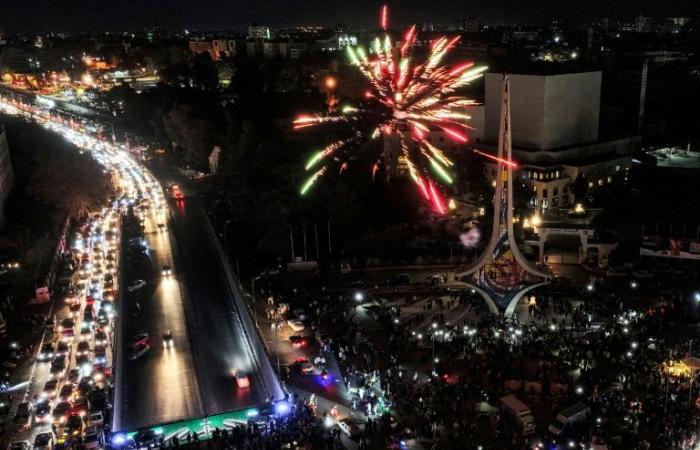Turkey, a major player in the conflict in Syria and support of the new authorities, is due to reopen its embassy on Saturday in Damascus after more than 12 years of closure, following the fall of President Bashar al-Assad.
In Jordan, American, European, Arab and Turkish ministers and officials hold a meeting in Aqaba on the Red Sea to discuss the Syrian issue after the flight of Mr. Assad, driven out on December 8 by a dazzling offensive by Islamist rebels who entered Damascus .
The day after celebrations across the country with crowds of jubilant Syrians celebrating the “victory of the revolution”, residents went about their business, particularly in Damascus.
Traffic police under the new authorities have been deployed on the streets of the capital, where municipal employees clean the roads.
Most businesses have reopened, including the famous al-Hamidiyé souk in old Damascus, according to AFP correspondents on site.
“We need to quickly revive activity in the souk,” says Amjad Sandouq, a trader. “The regime has fallen, but the State has not fallen, thank God.”
The head of Turkish diplomacy Hakan Fidan, who reported open lines of communication with the new masters of Damascus, announced that the head of mission had traveled to Damascus to open the embassy on Saturday.
The chancellery closed in March 2012, a year after the start of the civil war in Syria, triggered by the repression of pro-democracy demonstrations, and after calls from the Turkish government for the resignation of Mr. Assad.
– Direct Türkiye-HTS dialogue –
Following an 11-day offensive, a coalition of rebel factions led by the radical Islamist group Hayat Tahrir al-Sham (HTS) captured most of the country from government forces, ending half a century of power of the Assad family.
The new Prime Minister in charge of the transition until March 1, Mohammad al-Bashir, promised the rule of law and “guaranteeing the rights of all”, in the face of concerns from the international community.
HTS, led by Abu Mohammad al-Jolani, claims to have broken with jihadism but remains classified as “terrorist” by several Western capitals, including Washington.
With open lines of communication with the HTS, Turkey is directly conveying to them the concerns of the international community, which must be “resolved”, Fidan said. “No one knows them as well as we do, we want a Syria without terrorism (…).”
“We tell them (HTS): Turkey, which has supported you for years, as well as the world, expects this from you (…) Our duty and their test is to respond to these concerns,” he said. added.
– “No longer invest in Assad” –
Since 2016, Turkey has exercised considerable influence over northern Syria, maintaining relations with HTS which launched its offensive against power from Idlib (northwest), its stronghold.
Mr. Fidan also said that his country had convinced Russia and Iran, close allies of Mr. Assad, not to intervene during the rebel offensive. Russians and Iranians “quickly understood that Mr. Assad was no longer someone in whom they should invest.”
For its part, a delegation from Qatar is traveling to Syria on Sunday to prepare for the reopening of the embassy, according to a diplomat.
In Aqaba, Geir Pedersen, the UN special envoy for Syria, called for working to avoid “the collapse of Syrian institutions”, during a meeting with Secretary of State Antony Blinken, before the meeting international.
He also called for a “credible and inclusive” political process to form the next government.
“United, united, united, the Syrian people are united,” has become the leitmotif of Syrians since Mr. Assad fled with his family to Russia.
But the jubilation is accompanied by the painful quest of Syrians who are looking for their loved ones who disappeared during the decades of brutal repression by Assad, accused of the worst abuses.
– Israeli raids –
Several actors supported by different powers have been involved in the war in Syria, which has left more than half a million dead and forced some six million Syrians, or a quarter of the population, to flee.
In northeastern Syria, the United States maintains around 900 troops and supports the Kurdish-dominated Syrian Democratic Forces (SDF), which defeated the Islamic State (IS) jihadist group during the war and installed an autonomous administration. The FDS welcomed the fall of Mr. Assad
Israel, Syria’s southern neighbor, carried out new strikes on “military sites of the former regime” in Damascus and its suburbs, destroying a scientific institute and a “military airport”, according to the Syrian Observatory for Human Rights. man (OSDH).
The strikes also targeted “ballistic missile warehouses” and rocket launchers in Qalamoun, on the outskirts of Damascus, as well as “tunnels” under the mountains, the OSDH added.
These raids aim to “destroy what remains of the military capabilities of the next Syrian army”, according to the Observatory.
Do you have a real estate project in mind? Yakeey & Médias24 help you make it happen!


